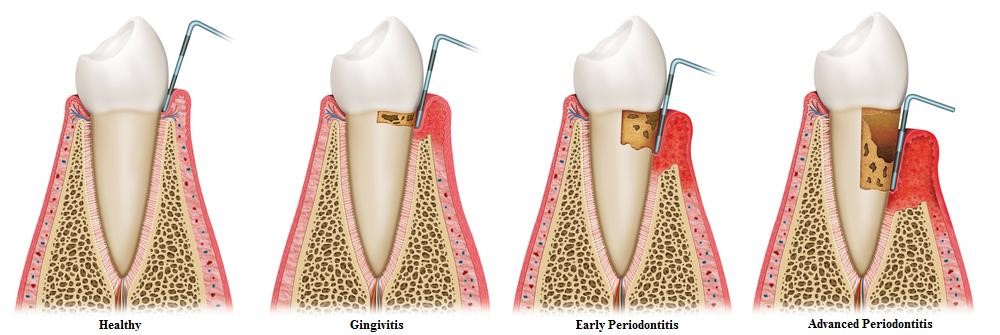Periodontal (Gum) Disease
Gum disease is a common problem that affects the gums and supporting tissues of your teeth.
Gum disease begin as inflammation of the gums around the teeth, and can progress to damage of the bone supporting the teeth if left untreated.
Common signs of gum disease include:
- Reddish and swollen gums that bleed easily
- Bad breath
- Gums receding, making teeth look longer
- Teeth becoming loose
- Teeth shifting, sometimes resulting in spaces or gaps to appear between your teeth
What causes gum disease?
Bacteria in the mouth can form a thin white sticky film on our teeth, called plaque.
The bacteria will release toxins to induce gum inflammation. The gum will appear red, swollen and bleed easily. This initial stage of gum disease is called gingivitis.When left untreated, the toxins will continue to damage the tissues and bone around the tooth, which will result in receding gums and resorption of the supporting bone. The tooth may become loose.
This stage of gum disease is called periodontitis.

Prevention of Gum Disease
Understand and practice the correct technique of brushing and flossing your teeth. The use of a good and soft toothbrush is also important. Your dentist can advise you accordingly.Brush at least twice a day and floss at least once a day. Be patient and invest sufficient time to clean your teeth thoroughly every day.
Remember you play a very important role in the prevention of gum disease.Visit your dentist every 6 months to get your teeth checked for signs of gum disease. Early detection and treatment is important.
Your dentist will perform Scaling and Polishing to remove plaque and tartar, and reinforce your brushing and flossing technique if there is a need.
Update your dentist on your medical condition, e.g. diabetes, pregnancy etc.
If you are a smoker, consider quitting. Smokers are more prone to develop gum disease.
Remember “Prevention is better than Cure”.
Treatment of Gum Disease
Your dentist will perform a thorough examination of your gum condition which may involve taking x-rays.Depending on the severity of your gum disease, the dentist may advise multiple sessions of deep gum cleaning.
For more severe cases, the dentist may recommend regenerative treatment options.
Regular review of the gum condition is important for the dentist to monitor the progress of the disease.
Your dentist will assess and explain suitable treatment plans according to the severity of your gum condition.

